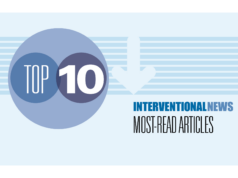 In August, the most popular stories from Interventional News included a feature on renal denervation and the techniques’ unexpected reappearance; a study which reveals an unforeseen neuropsychological effect following genicular artery embolization (GAE) for osteoarthritis; and a long-term Medicare study which uncovers a critical need for value-based care concerning peripheral vascular interventions (PVIs).
In August, the most popular stories from Interventional News included a feature on renal denervation and the techniques’ unexpected reappearance; a study which reveals an unforeseen neuropsychological effect following genicular artery embolization (GAE) for osteoarthritis; and a long-term Medicare study which uncovers a critical need for value-based care concerning peripheral vascular interventions (PVIs).
SonoVascular has announced the successful initiation of its first-in-human study (FIH) of the company’s SonoThrombectomy system, an ultrasound-facilitated, thrombolytic-enhanced platform that utilises multiple mechanisms of action to treat patients with venous thromboembolism (VTE). The catheter-based system combines microbubble-mediated cavitation with low-dose thrombolytic delivery to treat clots with no blood loss.
2. Inari Medical updates ClotTriever XL IFU amid US FDA recall notice
The US Food and Drug Administration (FDA) has issued a Class I recall—the most serious type—for Inari Medical‘s ClotTriever XL, 30mm device due to reports of patient injury, and death from device entrapment and pulmonary emboli (PE).
3. Money-maker or meritable: Is renal denervation out of retirement?
In a paper published in the July 2024 issue of the Journal of Hypertension, Andrew Sharp (University Hospital of Wales and Cardiff University, Cardiff, UK) et al reviewed 16 randomised controlled trials to assess the evidence of renal denervation’s (RDN) efficacy, concluding that, in uncontrolled arterial hypertension, RDN leads to a consistent reduction in blood pressure.
Continuing to divide opinion, as industry-led data regarding renal denervation emerge to show that the technique can provide a significant reduction in blood pressure long-term, some clinicians remain dubious.
4. Jupiter Endovascular announce US FDA approval for SPIRARE II trial
Jupiter Endovascular has announced that the US Food and Drug Administration (FDA) has approved its investigational device exemption (IDE) application for the SPIRARE II US pivotal study. The pivotal trial will study the Vertex pulmonary embolectomy system, which incorporates Jupiter’s Endoportal Control platform technology into endovascular procedures intended to treat acute pulmonary embolism (PE).
5. CIRSE begins CALCIO trial enrolment for treatment of CLTI with Shockwave IVL system
The Cardiovascular and Interventional Society of Europe (CIRSE) have announced that patient enrolment for the CALCIO trial has begun. CALCIO started patient enrolment on 15 July, 2024, with the goal of recruiting 400 chronic limb-threatening ischaemia (CLTI) patients over the next two years.
6. GAE for mild knee osteoarthritis deemed “safe” with unexpected neuropsychological effect
A new study has determined genicular artery embolization (GAE) to be a “safe intervention” for mild knee osteoarthritis (OA), showing a sustained benefit at two years. Published in the journal CardioVascular and Interventional Radiology, the authors state that the “learning curve” reflected in their technical success rates uncovers the “complexities” behind the safe and successful performance of GAE.
In a new post-hoc analysis of the Lutonix (BD) arteriovenous (AV) global registry using investigational device exemption (IDE) criteria, Dimitrios Karnabatidis (Patras University Hospital, Patras, Greece) reports the “highest” six-month target lesion primary patency (TLPP) to date when evaluated through IDE criteria, presented at the Endo Vascular Access (EVA) meeting (14-15 June, Patras, Greece).
8. Claudication: Long-term Medicare study highlights “critical” need for value-based care
A newly published US Medicare cohort study illuminates trends and factors associated with peripheral vascular interventions (PVIs)—including a sharp rise in the use of ambulatory surgical centres (ASCs) and office-based laboratories (OBLs) for treatment—from 2011 to 2022.
9. Bariatric embolization deemed relevant in combination with medication for optimised obesity therapy
In a session titled ‘Bariatric embolization: Is it the end or a new resurgence?’ at the Global Embolization Oncology Symposium Technologies (GEST) annual conference (16–19 May, New York, USA), Clifford Weiss (Johns Hopkins University, Baltimore, USA) made a case for “his future” and the future of bariatric embolization, providing the capability to “do surgery without doing surgery” to treat a highly comorbid patient population suffering with obesity.
10. BioCardia submits 510(k) approval for Morph DNA steerable introducer sheath family
BioCardia has submitted a 510(k) for approval of its patented Morph DNA steerable introducer sheath to the US Food and Drug Administration (FDA).









